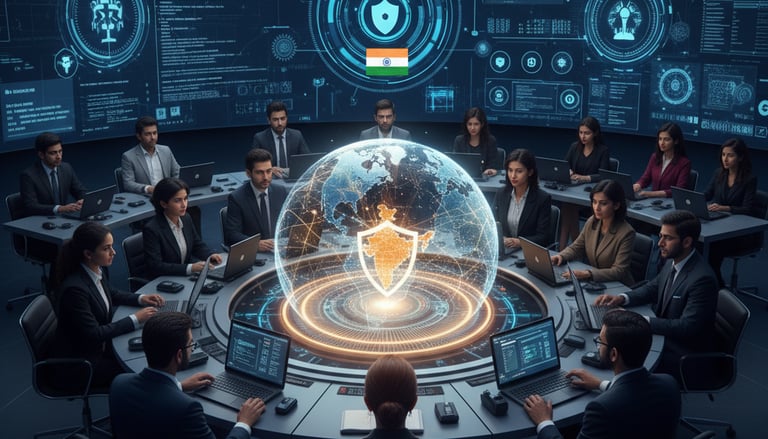Do You Know Cybersecurity Is India’s New Diplomatic Weapon
Cybersecurity has moved beyond IT—it’s now a powerful diplomatic tool. India is leveraging cyber defense, AI-driven monitoring, and global partnerships to protect national security and influence global policies. Discover how India is turning cybersecurity into its new weapon of diplomacy.
TECH & SCIENCEWORLD & POLITICS
Do You Know Team
9/7/20254 min read


In the 21st century, wars are no longer fought only with tanks and missiles—they are increasingly fought with data, codes, and networks. Cyberattacks can cripple economies, steal secrets, or manipulate elections without a single bullet fired. For nations, cybersecurity is no longer just a technical issue—it’s a strategic and diplomatic weapon.
India, home to 1.4 billion people and the world’s fastest-growing digital economy, has become a major target for cyber threats. But instead of staying defensive, India is turning cybersecurity into a tool of global diplomacy. By shaping cyber norms, building alliances, and investing in indigenous cyber tools, India is emerging as a global voice in cyber governance.
This article explores how India’s cybersecurity efforts are redefining its role in international diplomacy and making it a key cyber power on the world stage.
🔎 1. The Rise of Cybersecurity in Global Politics
Cyberattacks on critical infrastructure (like power grids, banks, and telecom networks) are now considered acts of war.
State-sponsored hackers from countries like China, Russia, and North Korea are frequently blamed for digital espionage.
Cyber norms—the global rules of the digital world—are being shaped by a few powerful nations.
India, with its digital economy worth $1 trillion by 2030, cannot afford to stay on the sidelines.
🛡️ 2. India’s Cybersecurity Challenges
India faces one of the highest volumes of cyberattacks globally:
Financial cybercrimes: UPI, Paytm, and mobile banking apps are frequent targets.
Government attacks: In 2022, AIIMS Delhi servers were hacked, exposing sensitive health records.
Defense espionage: Cyberattacks targeting Indian Army and Navy communication systems.
Ransomware: Hospitals, universities, and small businesses hit regularly.
According to CERT-In (Computer Emergency Response Team), India reported over 1.39 million cyber incidents in 2022 alone.
🌐 3. Cybersecurity as a Diplomatic Tool
India has moved from being a victim to becoming a rule-shaper:
Using cybersecurity to negotiate trade deals and defense pacts.
Collaborating with nations like the US, Japan, France, and Australia to build secure digital ecosystems.
Promoting data sovereignty, demanding that global tech giants store Indian user data locally.
Positioning itself as the voice of the Global South in cyber governance.
🤖 4. AI-Driven Cyber Defense in India
India is investing in AI and machine learning tools to detect cyber threats in real-time:
AI in banking: SBI and HDFC use AI models to block suspicious transactions.
Defense AI labs: DRDO developing AI for cyber warfare and predictive threat analysis.
Smart firewalls: Startups like Seconize and Lucideus (Safe Security) are providing risk-assessment platforms globally.
These AI-driven tools make India not just a user but an exporter of cybersecurity solutions.
🌏 5. India’s Role in Global Cyber Alliances
India is actively shaping global cyber diplomacy:
Joined the Quad Cybersecurity Partnership (India, US, Japan, Australia).
Regular cyber dialogues with the European Union.
Signed cyber defense pacts with Israel and France.
Advocating at the United Nations for fair cyber governance rules that don’t favor big tech monopolies.
By positioning itself as a trusted partner, India is gaining influence in global cyber policies.
🛠️ 6. Indigenous Cyber Tools: Building Atmanirbhar Bharat in Cyberspace
Launch of Cyber Surakshit Bharat Initiative in collaboration with Microsoft and Intel.
Development of indigenous encryption systems by DRDO.
Building NavIC-powered secure communication channels to reduce dependence on GPS.
Encouraging startups like Kratikal, WiJungle, and Innefu Labs to develop global-grade cybersecurity products.
This is aligned with India’s vision of self-reliance in digital defense.
⚔️ 7. Cybersecurity as Soft Power
Cybersecurity isn’t just about defense—it’s also about soft power:
India trains cyber experts from Africa and Southeast Asia.
Offers low-cost cyber solutions to developing nations.
This builds goodwill, positioning India as a leader of the Global South in digital trust.
💰 8. Economic Value of Cybersecurity Diplomacy
Cybersecurity industry in India is expected to reach $13.6 billion by 2025.
Exports of Indian cyber solutions are booming, particularly in banking, healthcare, and defense sectors.
India is emerging as a global outsourcing hub for cyber intelligence services.
🛰️ 9. Cybersecurity in India’s Defense Strategy
Indian Armed Forces have created a Defence Cyber Agency (DCA).
Cyber defense is now a part of joint military exercises with the US, Japan, and France.
Cyber intelligence is used alongside space tech and AI for hybrid warfare.
India tested its capabilities in cyber drills like Cyber Surakshit Bharat and NATO’s Locked Shields.
📡 10. Future of India’s Cyber Diplomacy
India aims to:
Build a global cyber security coalition of developing nations.
Push for UN cyber treaties against state-sponsored hacking.
Establish India as a net exporter of cyber intelligence.
Integrate AI + Quantum Computing for next-gen cybersecurity.
❓ FAQs – Cybersecurity as Diplomacy
Q1: Why is cybersecurity important for India’s diplomacy?
Because cyber threats affect national security, trade, and global trust, making it a diplomatic priority.
Q2: Which global partnerships has India signed in cybersecurity?
India has partnerships with US, Japan, Israel, France, EU, and Quad nations.
Q3: How is India using AI in cyber defense?
AI tools detect fraud in banking, monitor defense communication, and stop real-time phishing attacks.
Q4: Can India become a leader in global cyber governance?
Yes. With its large digital economy and trusted diplomacy, India is shaping new cyber norms.
Q5: What industries in India benefit most from cybersecurity growth?
Banking, e-commerce, defense, healthcare, and government services.
🏁 Conclusion
Cybersecurity has moved from back-end IT rooms to the center of international diplomacy. For India, it is not only a shield but also a sword—a tool to protect itself, build alliances, and influence global rules. As the world faces rising cyber warfare and digital espionage, India’s cyber diplomacy strategy ensures it stands not as a victim but as a global cyber power.
The next frontier of India’s diplomacy will not just be fought in parliaments and summits, but also in the digital battlefield of cyberspace.
#DoYouKnow #CybersecurityIndia #DigitalDiplomacy #IndiaCyberPower #GlobalCyberWar #AIinCybersecurity #IndiaTech #CyberDefense #DiplomaticWeapon
Knowledge
Empowering minds with reliable educational content daily.
Newsletter Signup
© 2025 DoYouKnow. All rights reserved.
Stay Ahead of the Trends – Join Our Newsletter
